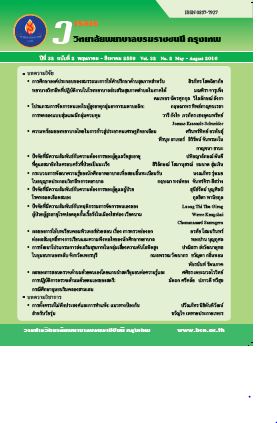การพัฒนาโปรแกรมการส่งเสริมสุขภาพในกลุ่มเสี่ยงความดันโลหิตสูงในชุมชนหนองพลับ จังหวัดเพชรบุรี DEVELOPMENT OF HEALTH BEHAVIOR PROMOTION PROGRAM AMONG PRE-HYPERTENSION ADULTS IN NONG-PLUB, PHETCHABURI PROVINCE
คำสำคัญ:
การพัฒนาโปรแกรม, กลุ่มเสี่ยงความดันโลหิตสูง, การส่งเสริมสุขภาพ, program development, hypertension risk group, health promotionบทคัดย่อ
บทคัดย่อ
การวิจัยครั้งนี้เป็นการวิจัยเชิงผสมผสาน มีวัตถุประสงค์เพื่อพัฒนาโปรแกรมการส่งเสริมสุขภาพในกลุ่มเสี่ยงความดันโลหิตสูงโดยการมีส่วนร่วมของผู้ป่วย ครอบครัวและผู้ที่เกี่ยวข้องของชุมชน กระบวนการวิจัยแบ่งออกเป็น 3 ระยะ ได้แก่ ระยะที่ 1 ประเมินสถานการณ์ ระยะที่ 2 พัฒนาโปรแกรมการส่งเสริมสุขภาพโดยมีส่วนร่วมของผู้ป่วย ครอบครัวและชุมชน และระยะที่ 3 ประเมินผล ผู้เข้าร่วมวิจัยเป็นกลุ่มเสี่ยงความดันโลหิตสูงจำนวน 38 คน สมาชิกในครอบครัวจำนวน 38 คน และผู้นำชุมชนจำนวน 12 คน เก็บรวบรวมข้อมูลเชิงคุณภาพและปริมาณ โดยการสัมภาษณ์เชิงลึก การสนทนากลุ่ม แบบสัมภาษณ์พฤติกรรมส่งเสริมสุขภาพและการวัดระดับความดันโลหิต วิเคราะห์ข้อมูลด้วยการวิเคราะห์เชิงเนื้อหา (Content analysis) และใช้สถิติพรรณนา ได้แก่ ความถี่ ร้อยละ และใช้สถิติ independent t-test
ผลการวิเคราะห์ข้อมูล พบว่าระยะที่ 1 การรับรู้ของกลุ่มเสี่ยงความดันโลหิตสูง กลุ่มเสี่ยงรับรู้ว่าอาการและอาการแสดงไม่ชัดเจน ไม่ใช่โรคร้ายแรงสามารถหายได้ ถ้ามีการปรับเปลี่ยนพฤติกรรมสุขภาพทำให้สามารถควบคุมความดันโลหิตได้ สมาชิกในครอบครัวและผู้นำในชุมชนส่วนใหญ่เห็นความสำคัญในการป้องกันการเกิดโรคความดันโลหิตสูงในกลุ่มเสี่ยงความดันโลหิตสูง มีความพร้อมในการช่วยดูแลในการจัดทำอาหารที่เหมาะสม ออกกำลังกายลดปัจจัยที่ทำให้เกิดความเครียด เป็นต้น สำหรับผู้นำในชุมชนโดยเฉพาะอาสาสมัครสาธารณสุขประจำหมู่บ้านมีความเข้มแข็งมากในการสนับสนุนส่งเสริมสุขภาพเนื่องจากเป็นคนในพื้นที่ที่มีความตั้งใจสูงในการทำงาน ระยะที่ 2 มีการสร้างโปรแกรมการมีส่วนร่วมของครอบครัวและอาสาสมัครสาธารณสุขประจำหมู่บ้าน ระยะเวลา 4 สัปดาห์ ระยะที่ 3 ประเมินผล พบว่า หลังการทดลองกลุ่มทดลองมีค่าคะแนนเฉลี่ยพฤติกรรมส่งเสริมสุขภาพสูงกว่าและระดับความดันโลหิตต่ำกว่ากับกลุ่มควบคุมอย่างมีนัยสำคัญทางสถิติ (p < .05)
Abstract
This mixed methods research aims to develop the health behavior promotion program for hypertension risk group with participation of patients, families and concerned persons in the community. The research was divided into 3 phases: 1) situation analysis, stage 2) development of health promotion program with participation of patients, families, and communities, and 3) program evaluation The participants included 38 adults at risk for hypertension with one of their family members as well as 12 community leaders. The qualitative and quantitative data were collected by means of in-depth interview, focus group interview, interview guide related to health promotion behaviors and blood pressure measurement. Data were analyzed by using content analysis and descriptive statistics: frequency, percentage, and independent t-test.
The results were as follows: Phase 1 the hypertension risk group’s awareness: the risk group perceived that the symptom of hypertension is unclear; hypertension is curable and not critical illness. The health behavior changes can enhance blood pressure control. Besides, most of family members and community leaders have recognized the importance of high blood pressure prevention for hypertension risk group and were ready to prepare suitable foods, to do exercises together, and to eliminate factors of stress. Meanwhile, the community leaders, especially village health volunteers were highly support the health promotion program because they were the local people who work dedicatedly. Phase 2 was development of four-week participatory program for family members and village health volunteers. Phase 3 program evaluation: The result revealed that, after participation in the program , the experimental group had a higher mean score of health promotion behaviors and a lower blood pressure level with a statistical significance (p < .05) in comparison to the controlled group.
Downloads
เผยแพร่แล้ว
How to Cite
ฉบับ
บท
License
บทความที่ได้รับการตีพิมพ์ เป็นลิขสิทธิ์ของวารสารวิจัยสุขภาพและการพยาบาล (วิทยาลัยพยาบาลบรมราชชนนี กรุงเทพ) ไม่สามารถนำไปตีพิมพ์ซ้ำในวารสารฉบับอื่น

















